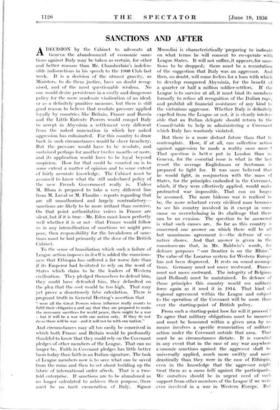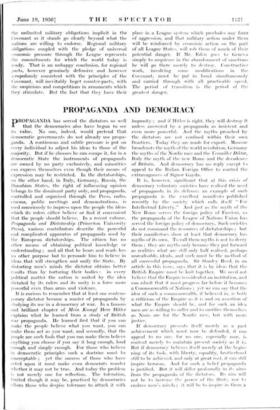SANCTIONS AND AFTER A DECISION by the Cabinet to advocate at
Geneva the abandonment of economic sanc- tions against Italy may be taken as certain, for other and better reasons than Mr. Chamberlain's indefen- sible indiscretions in his speech to the 1900 Club last week. It is a decision of the utmost gravity, as Ministers, to do them justice, have no doubt recog- nised, and of the most questionable wisdom. No one would desire persistence in a costly and dangerous policy for the mere academic vindication of an ideal, or as a definitely punitive measure, but there is still good reason to believe that resolute pressure .applied loyally by countries like Britain, France and Russia and the Little Entente Powers would compel Italy to accept in Abyssinia a settlement very different from the naked annexation in which her naked aggression has culminated. For this country to draw hack in such circumstances would be sheer treachery. But the pressure would have to he resolute, and sustained perhaps for another twelve months or more, and its application would have to be loyal beyond suspicion. How far that could be counted on is to sonic extent a matter of opinion and to some extent of fairly accurate knowledge. The Cabinet must be assumed to know -what the still undeclared policy of the new French Government really is. Unless M. Blum is prepared to take a very different line from M. Laval or M. Flandin—reports regarding that are all unauthorised and largely contradictory— sanctions are likely to be more irritant than coercive. On that point authoritative voices in France are silent, but if it is true—Mr. Eden must know perfectly well whether it is or not—that France would follow us in any intensification of sanctions we might pro- pose, then responsibility for the breakdown of sanc- tions must be laid primarily at the door of the British Cabinet.
- To the sense of humiliation which such a failure of League action imposes in itself is added the conscious- ness that Ethiopia has suffered a far worse fate than if its Emperor had hesitated to rely on the word of States which claim to be the leaders of Western civilisation. They pledged themselves to defend him, they could have defended him, they defaulted on the plea that the cost would be too high. That may yet prove a disastrously false calculation. There is pregnant truth in General Hertzog's assertion that
" were all the Great Powers whose influence really counts to fulfil their obligatiors and say that they are prepared to make the necessary sacrifices for world peace, there might be a war —but it will be a war with one nation only. If they do not do so there will be war—and it will not be with one nation."
And circumstances may all too easily be conceived in which both France and Britain would be profoundly thankful to know that they could rely on the Covenant pledges of other members of the League. That can no longer be. Faith in Covenant pledges has little better basis today than faith in an Italian signature. The task of League members now is to save what can be saved from the ruins and then to set about building up the fabric of international order afresh. That is a two- fold enterprise. If sanctions are to be abandoned. as no longer calculated to achieve their purpose, there must be no tacit exoneration of Italy. Signor Mussolini is characteristically 'preparing to indicate on what terms he will consent to co-operate with League States. It will not suffice, it appears, for sanc- tions to be dropped; there must be a recantation of the suggestion that Italy was an aggressor. And then, no doubt, will come feelers for a loan with which to develop conquered Abyssinia; for the benefit of a quarter or half a million soldier-settlers. If the League is to survive at all, it must bind its members formally to refuse all recognition of the Italian rape, and prohibit all financial assistance of any kind to the victorious aggressor. Whether Italy is definitely expelled from the League or not, it is clearly intoler- able that an Italian delegate should .return to the Council-table to help in administering a Covenant which Italy has wantonly violated.
But there is a more distant future than that to contemplate. How, if at all, can collective action against aggression be made a reality once more ? That question is better put in London than in Geneva, for the essential issue is what in the last resort the average Englishman or Scotsman is prepared to fight for. It was once believed that he would fight, in conjunction with the mass of States, for the principles embodied in the Covenant, which, if they were effectively applied, would make protracted war impossible. That can no longer be assumed. The more hideous war is realised to he, the more reluctant every civilised man becomes to see his country involved in it except in some cause so overwhelming in its challenge that there can be no evasion. The question to be answered is what such causes are. So far as this country is concerned one answer on which there will be all but unanimous agreement is—the defence of ' our native shores. And that answer is given in the consciousr ess that, in Mr. Baldwin's words, for defence purposes " our frontier is on the -Rhine." The value of the Locarno system for Western Europe has not been disproved. It rests on sound assump- tions. Germany must not move westward. France must not move eastward. The integrity of Belgium (and Holland) must be maintained. In defence of those principles this country would use military force again as it used it in 1914. That kind of regional agreement within the League and subject to the operation of the Covenant will be more than ever the starting-point of British policy.
From such a starting-point how far will it proceed ? To agree that military obligations must be incurred and must be honoured within a given area by n() means involves a specific renunciation of military action under the Covenant outside that area. That must be as circumstances dictate. It is essential in any event that in the case of any war anywhere economic sanctions against the aggressor shall be universally applied, much more swiftly and more drastically than they were in the case of Ethiopia, even in the knowledge that the aggressor might treat them as a casus belli against the participants. We ourselves should be in urgent need of such support from other members of the League if we were ever involved' in a war in Western Europe. But the unlimited military obligations implicit in the Covenant as it stands go clearly beyond what. the nations are willing to endorse. Regional military obligations coupled with the pledge of universal economic pressure through the League represents the commitments for which the world today is ready: That is an unhappy conclusion, for regional pacts, however genuinely defensive and however scrupulously consistent with the principles of the Covenant, will inevitably beget counter-pacts, with the suspicions and competitions in armaments which they stimulate. But the fact that they have their place in a League system which precludes any form of aggression,' and that military action under them will be reinforced by economic action on the part of all League States, will rob them of much of their potential danger. If Mr. Eden goes to Geneva simply to acquiesce in the abandonment of sanctions he will go there merely to destroy. Constructive work, involving some modifications in the Covenant, must be put in hand simultaneously and carried through with all practicable speed. The period of transition is the period of the greatest danger.











































 Previous page
Previous page